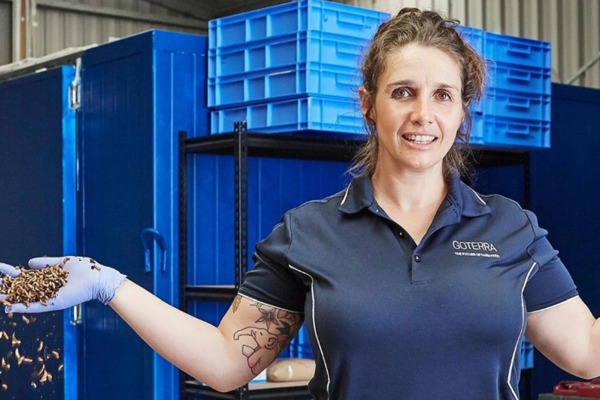Published on the 25/02/2021 | Written by Heather Wright

Agtech goes sky high; biotech goes to waste…
Robots working hand in hand with maggots to tackle food waste, reduce carbon emissions and produce animal feed; low orbit satellites monitoring water levels – tech’s helping hand when it comes to the environment and farming is extending to new levels.
And in both those cases, it’s Aussie companies leading the way.
Canberra-based Goterra (its name is a mash up of the ‘got’ from maggot and the ‘erra’ from Canberra), has set its sights on helping reduce the eight percent of carbon emissions coming from food waste, while also providing cheaper, more environmentally friendly animal feed options for farms.
“We use robots in harmony with maggots to break down food waste live on site.”
The company, founded by farmer Olympia Yarger in 2016, uses high tech robotics ‘collaborating’ with real maggots. The robot run automated capsules, filled with maggots that process food waste, are already in use in hotels, restaurants, farms, supermarkets, hospitals and some government departments. The modular systems containing black soldier fly larvae, turn food waste into fertiliser – before the maggots themselves are turned into high-protein feed for livestock.
Because the self-contained capsules are automated they can run by themselves with little human intervention.
“We use robots in harmony with maggots to break down food waste live on site,” Yarger says. “The maggots eat their way through the waste, and produce animal feed that we can sell to farms, giving them a cheaper, more environmentally friendly option for their livestock.
“For our customers, this means cutting costs on their food waste transportation, storage and disposal. For farmers, it means cutting costs on feed and reducing their environmental impact.”
Yarger says the maggot-powered infrastructure consumes carbon dioxide so rapidly that it reduces CO2 emissions by 98 percent and, by being processed at site, remove both the cost and the environmental impact of transporting waste.
It’s a proposition which has won favour with some heavy duty backers including agtech venture capital firm Tenacious Ventures, Atlassian co-founder Mike Cannon-Brooke’s Grok Ventures, Rampersand, and the Salteri-backed Cages Foundation.
While Goterra might be down to earth, another Australian initiative is taking to the skies to help farmers better manage their water resources.
The ‘world first’ offering uses a network of nanosatellites to provide a low-cost, low-power solution for IoT connected devices, enabling farmers to remotely monitor rain and tank levels without a mobile or GPS connection.
The GoRain and GoTank offerings from Queensland farm sensing provider Goanna Ag, are designed to help farmers monitor rain data remotely and make data-driven decisions to optimise water use and support stronger crop yields, and to remotely monitor and update farmers on water tank levels.
“Rainfall is the fundamental driver of agricultural production, and while we can’t make it rain more, Go Rain and GoTank will bring confidence to decision making for our hard-working food and fibre producers,” says Goanna Ag CEO Alicia Garden.
Broden Holland, who has a 3,500 hectare farm in New South Wales, says the insights provided from capturing and understanding data from across the farm enables has enabled more informed and timely decisions.
“This has given us the confidence to increase our inputs to push our yields higher.”



























